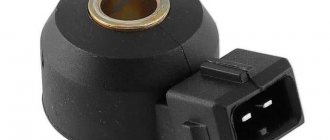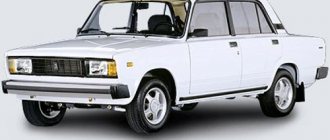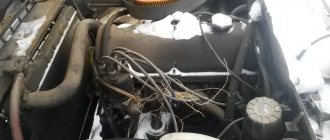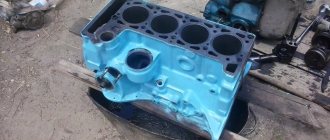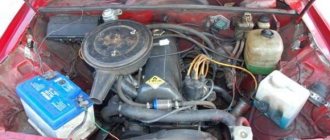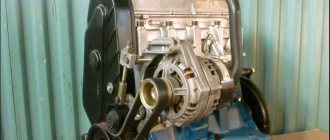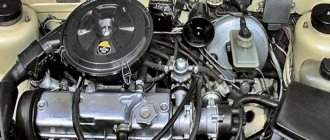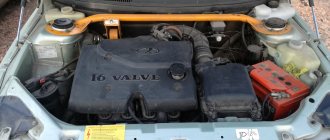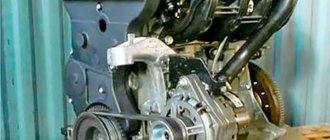One of the most unpleasant situations in which every driver risks finding himself is an unexpected knocking sound in the car engine.
Reliably determining the causes of its occurrence is not an easy task. The only thought that immediately comes to mind is that the engine is faulty and requires immediate diagnosis and expensive repairs.
In general, if the engine knocks, it is the result of metal parts hitting each other. It is accompanied by a sharp increase in load at the points of contact of interacting parts. As a result, parts are destroyed, and the faster the stronger the impact.
Engine knocking may occur due to:
- manufacturing defects (on a new car);
- unprofessional repairs;
- using motor oil whose characteristics do not comply with the recommendations of the vehicle manufacturer;
- refueling with low-quality fuel;
- improper operation (vehicle overload, aggressive driving style, etc.)
The engine knocks for no reason only in the case of natural wear of parts to the limit values.
In order to quickly assess the situation and make the right decision, you must first make sure that it is the engine that is knocking, and then try to classify the knock.
Engine knocking when cold
A knock when starting a cold engine, which disappears after it warms up, is associated with the natural wear of its parts, which after warming up take on standard sizes, clearances, etc. A knock in a cold engine differs from a knock in a hot engine in that it goes away after the engine warms up.
Any spare parts that may be required when repairing an engine, including those from leading manufacturers MAHLE and ADDAX-Q, can be found in IXORA stores.
Managers will always help you when choosing a product. * Please check the applicability of parts specifically for your car with our managers by phone (calls within Russia are free).
| Manufacturer | Detail number* | Part name |
| ADDAXQ | CZB003 | Inlet valve |
| ADDAXQ | CZC004E | Exhaust valve |
| MAHLE | 029FX31174000 | Valve guide |
| ADDAXQ | CJC045S | Connecting rod bearing STD |
| MAHLE | 03319N0 | Piston rings |
| MAHLE | 02202N0 | Piston rings |
| ADDAXQ | CJC044A | Main liner 0.25 |
| MAHLE | 08316N0 | Piston ring set |
| MAHLE | 029FX31173000 | Valve guide |
| MAHLE | 0116902 | Piston |
| MAHLE | 0122100 | Piston with pin and rings |
| ADDAXQ | CJA026B | Connecting rod bearings |
| ADDAXQ | CJA034S | Connecting rod bearing STD |
| MAHLE | 001AS18750000 | Axial displacement semi-ring |
| MAHLE | 00249N0 | Piston rings |
| MAHLE | 0045900 | Engine piston |
| MAHLE | 01195N1 | Piston ring set |
| MAHLE | 011VE30337000 | Inlet valve |
| MAHLE | 01317N0 | Piston rings |
| MAHLE | 01337N2 | Piston rings |
How is detonation formed?
If the engine runs stably and without interruptions, the combustion process of the air-fuel mixture maintains its consistency. The motor operates quietly, there is no extraneous noise. The process begins with a spark from the spark plug, after which the entire combustion chamber is filled. This happens equidistantly.
In the case of detonation or detonation combustion, the process looks different. The entire amount of the mixture of fuel and air injected into the chamber ignites simultaneously. This leads to a sharp and strong increase in the temperature of the cylinders and the pressure inside them. During detonation, the mixture does not burn completely. In areas where the largest volume of unburned fuel remains, active chemical compounds gradually appear.
Typical causes of ringing “fingers” during normal operation of the internal combustion engine
If the “fingers” knock during acceleration in the Kalina, the mass air flow sensor may have failed. If it is not working correctly, then the ECU will receive incorrect information and issue incorrect commands. Another reason is an incorrectly set ignition timing. For this reason, the point at which the fuel will burn maximum is approaching TDC. This leads to increased pressure in the combustion chamber. If the “fingers” knock when accelerating on a Ford Focus, then the knock damping sensor may have failed. It's definitely worth checking this item. If it stops working, it should be replaced.
Poor quality fuel is the cause of all the troubles that happen to cars. This has already been described in detail above. It should be noted that knocking fingers is not always a problem that has formed during the use of the car. There are situations when a car comes from the factory with incorrectly connected sensors. This ultimately leads to detonations and knocking. This problem is especially dangerous because the engine is being run-in and detonation is especially harmful for it. It should be excluded.
Preliminary diagnosis
When you hear unfamiliar sounds coming from the engine compartment of your car, you need to make sure that their source is the car’s engine.
To do this you need:
- Press the clutch pedal and disengage the gearbox and transmission. This eliminates the influence of these components on engine operation.
- Drive the car onto an overpass or install it in a viewing hole in the garage.
- Quite often, the cause of extraneous sounds is engine mounts, a generator, or a water pump. They need to be checked. It is advisable to temporarily dismantle any suspicious parts.
- If after these operations the engine continues to knock, then this is where the problem lies.
Exact localization of the problem
Some knocks can be characterized unambiguously, since they are not similar to each other. For example, pistons that have already exhausted their service life sound dull and can be compared to light blows on clay products. Sometimes there are clicks. The gap of 0.3 mm is compensated by the expansion of the metal, so this problem does not appear on a warm engine. The sounds are more distinct when the car has cooled down to street temperature or the driver suddenly takes his foot off the gas pedal.
Problems with piston pins are also easy to identify. The engine produces a distinct metallic sound, which is better heard when accelerating or releasing the gas. Often the problem arises due to low-quality fuel, which ignites early, which creates a characteristic sound. And if this sound is distinct, then the crankshaft liners are more difficult to hear.
If the “knee” liners have exhausted their service life, the car owner will hear a slightly muffled sound that will come from the engine crankcase. But this situation does not appear without a reason, since the element is simple and reliable in operation. And the first thing we pay attention to is what “consumables” were purchased for the last service station. The problem may arise as a result of using low-quality oil, so first you need to change it and flush it, and not do a major overhaul of the engine.
The problem with the connecting rod bearings can definitely be localized. The sound increases gradually as the car accelerates. With such a problem, it is useless to change the oil or fuel, since all you can do is turn on the emergency lights and wait for the tow truck. If you decide to travel independently, the internal combustion engine will jam, which will lead to large material losses.
Driver actions when knocking occurs
We will have to repeat this truism for the umpteenth time, but if a knocking noise occurs while driving the car, it is recommended to check the current oil level. To do this, you will have to stop and use the probe to perform this simple procedure.
If the knocking appeared on a cold engine, but then disappeared, there is nothing to worry about. You can calmly, without overloading the engine, drive to a garage or car service center, carry out diagnostics and find the cause.
When a knocking noise appears when the engine is hot and gradually increases, in such a situation it is better to stop the vehicle, turn off the engine and call a tow truck. Trying to get to the service center on your own is potentially dangerous, since with every kilometer the cost of repairs will increase in proportion to the destruction of engine components.
Regardless of the causes and provoking factors, any knocking in the engine becomes a reason to carry out diagnostics and carry out some repair work. Depending on how correctly you can determine the causes of knocking, you will be able to minimize the financial and time costs of repairs. Some faults require surface dismantling and simple manipulations. Others involve complete disassembly of the engine, which requires a lot of time, effort and certain skills. It is not always worth taking on such work yourself.
